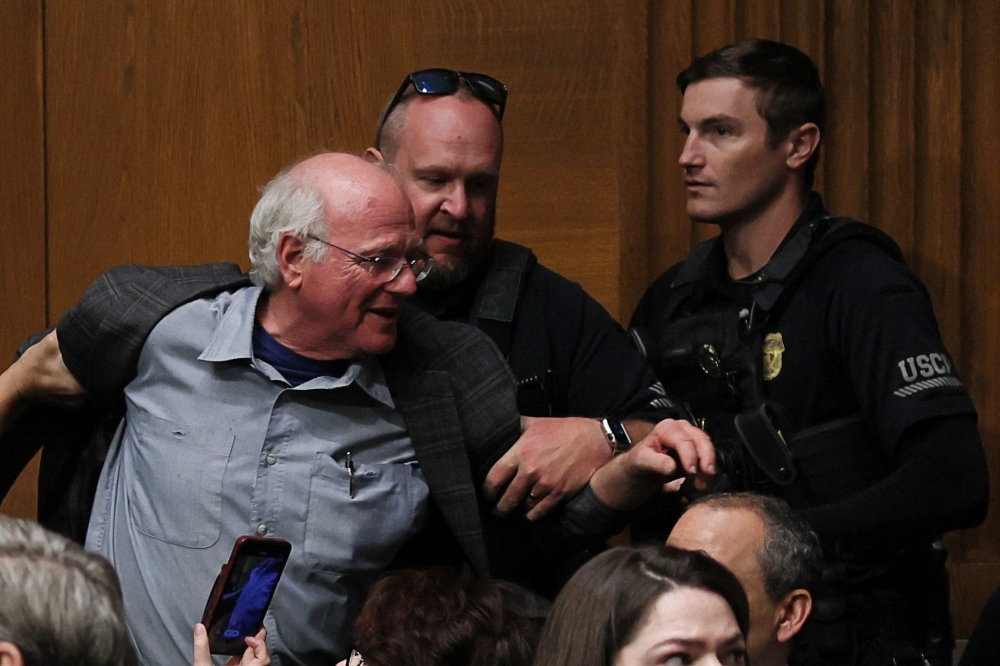The Outcry Over Gaza: Ben Cohen’s Arrest and Activism
On May 15, 2023, Ben Cohen, co-founder of the acclaimed ice cream brand Ben & Jerry’s, found himself at the center of a heated political discourse in Washington. His passionate protests during a US Senate hearing have made ripples in both public opinion and media coverage regarding the ongoing humanitarian crisis in Gaza. Cohen’s actions resonate with a growing discontent among many Americans who feel that their government’s actions abroad are at odds with its duties to its own citizens.
Cohen’s Provocative Protest
Cohen, now 74, was among a group of protesters who interrupted Health Secretary Robert F. Kennedy Jr. during a Senate hearing focused on the Department’s budget proposal. The interruptions came as a shock to both attendees and the Secretary, with Cohen shouting, “Congress pays for bombs to kill children in Gaza.” This statement encapsulated the frustration many feel as discussions about slashing Medicaid loom while military expenditures continue to escalate.
Upon being escorted from the premises with handcuffs by Capitol Police, Cohen emphasized a crucial plea: senators must advocate for humanitarian relief, especially food access for “starving kids” affected by the conflict. His arrest was not merely a personal statement but a representation of millions of voices lamenting the loss of life in Gaza.
Financial Support for War vs. Social Programs
In an interview following his release, Cohen laid bare his discontent with the state of American priorities. He highlighted the stark contradiction of approving “US$20 billion worth of bombs” for Israel while social services that aid low-income families are threatened. This point of contention reflects a broader trend in public sentiment, especially within the Democratic Party, as revealed by recent polling data from the Pew Research Center. The poll indicates a significant shift in public opinion towards Israel, with many expressing unease over the ongoing military conflict and its humanitarian implications.
A Moral and Spiritual Reckoning
Cohen’s critique extends beyond mere financial allocations; he urges a deeper moral reflection. He views the complicity in what he calls a “slaughter of tens of thousands” as a fundamental violation of human rights and American values. The narrative he weaves encourages citizens to confront the moral implications of their government’s foreign policy. Cohen eloquently articulated the need for a shift in priorities, suggesting that an alternative approach—utilizing resources to improve global lives—could foster less friction in international relations.
Using a parental analogy, Cohen remarked on the simplicity of conflict resolution: “You go to a three-year-old who goes around hitting people and you say, ‘Use your words.’” This analogy underscores the belief that diplomatic dialogue should replace violence in resolving disputes between nations.
Advocacy for Change and Community Voices
Cohen’s activism isn’t born out of isolation; it connects to a wider network of voices within progressive circles. Last year, he joined other prominent Jewish figures in an open letter opposing the powerful pro-Israel lobby, AIPAC. By acknowledging his role as a prominent figure, Cohen insists that he represents countless voices of dissent against the prevailing political norms regarding Israeli policies.
The Humanitarian Crisis in Gaza
The backdrop of Cohen’s protest is a humanitarian crisis that continues to escalate. The conflict reignited dramatically after the October 7, 2023, attack by Hamas, leading to significant casualties on both sides. According to official figures, approximately 1,218 people in Israel lost their lives, primarily civilians. However, the scale of destruction in Gaza is staggering, with at least 52,928 reported deaths, predominantly among civilians as well. This stark discrepancy underscores the dire circumstances and amplifies the urgency of calls for humanitarian intervention.
The United Nations reports that Gaza is now facing a critical risk of famine, exacerbated by a blockade that has lasted for over two months. The prospect of a humanitarian catastrophe looms large, with 22% of the population facing severe food insecurity, prompting calls for immediate action and aid to those trapped in the conflict.
Ongoing Public Debate
Cohen’s arrest in Washington serves not only as a personal expression of activism but as a catalyst for deeper conversation across the nation. His passionate appeals aim to shift the narrative surrounding U.S. foreign aid, military spending, and humanitarian responsibilities. It reflects a grassroots movement that is increasingly vocal and determined to advocate for a change in policy that aligns with a more compassionate and constructive approach to international relations.
In these critical times, the voices of activists like Ben Cohen are not just individual protests; they’re part of a larger chorus demanding accountability, compassion, and a re-evaluation of what it means to stand for human rights both at home and abroad.


